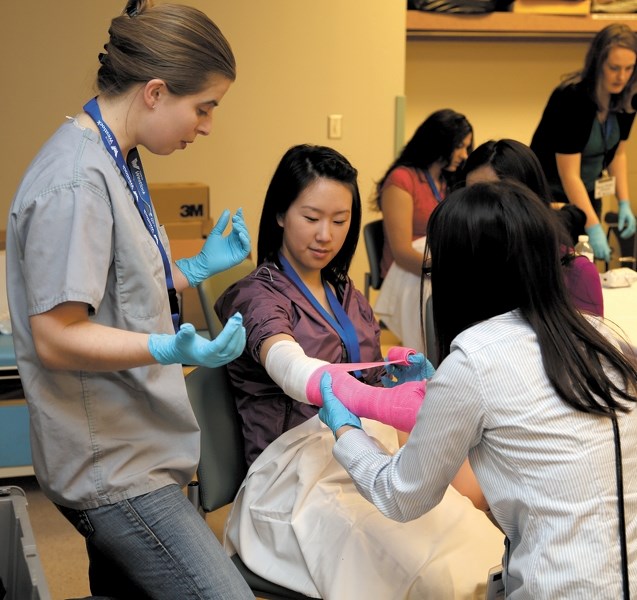Last Saturday, 59 medical, nursing and physical therapy students from the University of Alberta descended on the Westlock hospital.
The students were in town as part of the Rural Community Exposure and Medical Skills Weekend series, a program run by the Rural Physician Action Plan (RPAP) to help entice medical personnel to move to more rural communities once their education is over.
“It’s all about recruitment,” said Lee Rehak. “It has a real potential to get every student excited about working in a rural setting.”
Rehak is a student at the U of A, and a co-leader with the Rural Medicine Interest Group, a liaison between the U of A and RPAP.
While at school, he said students generally only get a big-city view of medicine, with not much exposure to what happens and what is available in small towns.
“This is a way to see other hospitals and other environments,” Rehak said. “The students may be more inclined to stay in the big cities, but this shows them what a small town is like.”
During the day, the students made their way all around the hospital, stopping at six different stations set up to work with local doctors and learn skills that they will likely need to know when they get out into the working world.
Some of the skills they worked on included suturing using pig feet, casting using their own arms, spinal immobilization and obstetrics.
Also on site was the STARS mobile training unit, which gave students the chance to apply their skills in emergency scene management and thinking on their feet.
Two of the students attending the weekend are scheduled to spend their third year of med school in Westlock as part of the Integrated Community Partnership.
One of those students is Kim McRae. Currently a second-year med student, she is looking forward to coming back in August to work in the hospital again.
“I’m excited; the hospital is beautiful,” she said.
Being from Edmonton, McRae said she hasn’t lived in a rural setting before, but is eager to see what it would be like. Plus, since her husband won’t be joining her, she’s happy Westlock is not that far away from the urban Edmonton environment.
One specific reason she singled out about why she’s interested in rural medicine is that there is less specialization required. She said she likes the idea of doing many different things instead of specializing on only one, adding she doesn’t really like the idea of doing the same thing day in and day out.
While the majority of students were training to be doctors, there were many who were working towards becoming nurses.
One of those was Fatima Ahmed, who said she found her first two sessions — obstetrics and cardiac emergencies — to be both “educational and still fun.”
“It was because they were interactive,” she explained. “You get to get up and manipulate the dolls. You’re learning through guidance. It’s ‘Here’s what you do, now try it.’”
Ahmed said she liked the facilities in Westlock, noting because the hospital is relatively small, it’s much more efficient than larger facilities. She explained that in a smaller hospital, people multitask, and so to get information about different things all at once, it’s often only necessary to speak to one person.
As for why she chose to participate in the weekend despite having an exam early this week, she said it was an opportunity she didn’t want to pass up.
“To get an opportunity to learn just by showing up, it’s worth it,” Ahmed said.
Westlock doctor Firdaus Mydeen, a member of the town’s physician recruitment committee, said days like the weekend are the perfect opportunity to market what Westlock and other small towns have to offer as a potential future career location.
“It’s a very different practice than in an urban setting,” he said. “You’re doing many things, from the OR (operating room) to maternity. You’re basically a generalist.”
Following the skills sessions, the students, doctors and town and county representatives gathered at the Westlock Rotary Spirit Centre to mingle and talk about what is available in the community outside the work environment.



